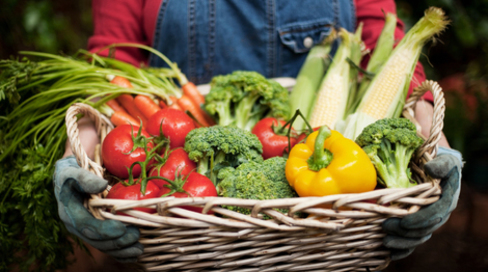Yesterday the White House and USDA hosted a meeting with food, agriculture and data industry officials in an attempt to encourage innovation to stem the effects of climate change on agriculture and food production
Beyond "stemming" the effects of climate change on agriculture however, the way we produce food has the potential to substantially address and even reverse many of the root causes driving climate change.
Here's how:
The overall global food system -- including land-use changes, feed, fertilizer, transportation, refrigeration, processing and waste -- is estimated to be responsible for 30 to 50 percent of global greenhouse gas emissions. Over the last decade, agricultural emissions have increased by approximately 1 percent per year.
Researchers at the World Bank Group estimated intensive livestock production alone is the largest single contributing factor to climate change. Industrial animal agriculture is also one of the largest polluter of air, water and land, and the largest consumers of fossil fuels and water and yet feed only a relatively small percentage of the world's population, compared with those fed by small-scale farmers who continue to be the major producers of the world.
While the United Nation's International Panel on Climate Change (IPCC) predicts global food production to fall by 2 percent per decade for the rest of the century, there is an increasing body of research that shows how agro-ecological, or organic, regenerative agricultural practices can actually feed a growing population while repairing our damaged ecosystem.
Take soil, for example. Some may think that soil is just "dirt," brown stuff that holds plants in the ground. But soil is an organism in itself, and healthy soil is rich in microorganisms,which under optimal circumstances live in symbiotic relationships with the plants. Healthy soils store vast quantities of atmospheric carbon. Improving soil health is therefore an integral part of reversing CO2 levels.

Credit: Center for Food Safety
|
According to cutting edge agricultural research, including that outlined in the Rodale Institute's white paper, Regenerative Organic Agriculture and Climate Change, "recent data from farming systems and pasture trials around the globe show that we could sequester more than 100 percent of current annual CO2 emissions with a switch to widely available and inexpensive organic management practices, which we term "regenerative organic agriculture."
As well as sequestering carbon, regenerative organic and agro-ecological systems can mitigate the chaotic effects brought about by climate change, such as flooding. Healthy soils have structure that allows them to retain large quantities of water. This structure not only holds soil in place preventing erosion, it also allows plants to be more tolerant of weather extremes. Regenerative systems increase the amount of carbon in soil while maintaining yields. In fact, research shows that yields under organic systems are more resilient to the extreme weather which accompanies climate change.
Conventional agricultural practices have resulted in a loss of 30-75 percent of original organic soil carbon, as well as being heavily reliant upon synthetic fossil fuel-based nitrogen fertilizer, mono cropping and toxic pesticides. Regenerative, organic agriculture on the other hand refrains from using fossil-fuel based inputs and instead utilizes cover crops, integrated pest management systems, residue mulching, composting, and crop rotation, and conservation tillage. Organic agriculture also uses 30-50 percent less fossil fuel energy than industrial farms.
The path ahead:
What can the federal government do?
- Eliminate subsidies which incentivize the most destructive industrial, chemical intensive monoculture crop and animal factory practices
- Increase funding for research that studies the carbon sequestration potential of regenerative agriculture practices
- Protect American cropland from development, monocultures and destruction of biodiverse wildlife habitat
- Implement organic regenerative stewardship practices on federal lands
What can you do to help mitigate climate change?
- Grow or buy local
- Buy organic
- Reduce food waste -- 50 percent of food produced in America is wasted
- Eliminate industrial meat, dairy and eggs from your diet and reduce overall consumption of animal products and if choosing to eat meat, seek out 100 percent grassfed products.
- Work with your local authorities to particularly from animals raised in animal factories
- protect local agricultural land from land grabs and wasteful development
What will this do for you?
- Reduce your consumption of and exposure to chemicals
- Reduce your carbon footprint
- Increase your health -- a diet rich in plant-based foods can help reverse diseases can reduce the risk of health problems such as Type II diabetes, heart disease,and high cholesterol whereas meat and dairy can increase these risks
- Increase your food security by supporting your regional foodshed.
Recommended further reading:
Food and Climate - Connecting the Dots, Choosing a Way Forward
Regenerative Organic Agriculture and Climate Change: A Down-to-Earth Solution to Global Warming - Rodale Institute
Livestock and Climate Change
Trade & Environment Review 2013 Wake Up Before it's Too Late: Make agriculture truly sustainable now for food security in a changing climate - UNCTAD
Climate-Smart Agriculture Sourcebook - FAO
Putting Meat on the Table: Industrial Farm Animal Production in America - Pew Commission on Industrial Farm Animal Production Report
ABOUT THE AUTHOR
Elizabeth Kucinich is Policy Director of the Center for Food Safety (CFS). An experienced advocate and government affairs professional, she came to CFS from the Physicians Committee for Responsible Medicine (PCRM), where she advocated prevention over cure, nutrition over drugs, and human-relevant research and training over the use of animals.
Before joining PCRM, she was a congressional liaison for the 63rd President of the United Nations General Assembly. Elizabeth serves as a board director of several notable organizations including Sean Penn’s Haitian relief organization, J/P HRO, and the Rodale Institute.
Elizabeth is the Executive Producer of GMO OMG, a documentary exploring genetic engineering in agriculture and food production, which premiered at the Berlin International Film Festival in February 2013. She is also a producer of Hot Water, a documentary about the nuclear industry, uranium mining and the radioactive pollution of our water. "Hot Water" premiered at the DC Environmental Film Festival in March 2013.
|